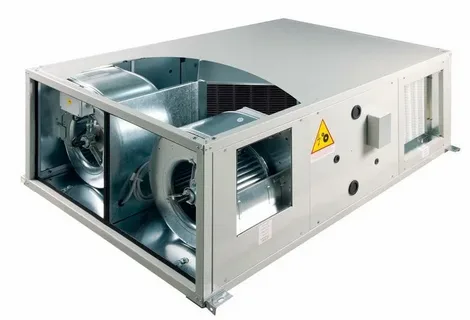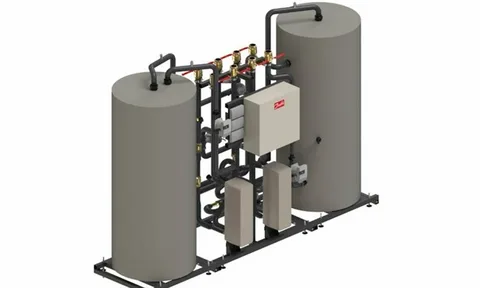As the world becomes increasingly aware of the importance of reducing energy consumption and mitigating the impact of climate change, innovative solutions are emerging to help us achieve our sustainability goals. Among these solutions, heat recovery unit is revolutionizing how they approach heating systems, offering a game-changing opportunity to maximize energy efficiency and minimize carbon emissions. By harnessing the waste heat generated by various processes, such as cooling systems, exhaust gases, and industrial processes, heat- recovery units can recover and reuse this heat, reducing the need for primary energy sources and minimizing the environmental footprint of our homes and businesses.
How does Hrus Work?
At the heart of a heat- recovery unit (HRU) lies a sophisticated technology that allows it to capture and reuse the heat that would otherwise be wasted. The process begins with integrating the HRU into your heating system, typically after the boiler or heat source. As the heat source produces hot water or steam, the HRU extracts the heat from the exhaust gases, condensate, and other waste streams.
The extracted heat is then transferred to a secondary heat exchanger, which preheats the heating water or air, reducing the energy required to heat the building. This process is often called ‘heat recovery’, a game-changer for businesses and homeowners alike.
In addition to its energy-saving benefits, an HRU can also help to reduce the workload of the boiler or heat source, allowing it to operate more efficiently and at a lower temperature. This can help extend the boiler’s lifespan and reduce the need for costly repairs and replacements.
 Benefits Of Using A Heat- recovery unit
Benefits Of Using A Heat- recovery unit
A heat- recovery unit is a game-changer for optimizing their heating system and reducing energy bills.
Environmentally Friendly
These innovative systems can provide a significant return on investment by harnessing heat that would otherwise be wasted. Heat- recovery units help conserve energy and reduce the heat released into the atmosphere, making them a more environmentally friendly option.
Reducing Your Reliance On Traditional Sources
One of the most significant benefits of using a heat- recovery unit is reducing energy consumption. By recovering heat from the flue gases, these units can provide up to 50% of the energy needed to heat your home, reducing your reliance on traditional heating sources. This saves you money on your energy bills and reduces your carbon footprint.
Ability To Provide A Consistent Heat
Another major advantage of heat- recovery units is their ability to provide a consistent and reliable heat source. Unlike traditional heating systems, which can be prone to temperature and flow rate fluctuations, heat- recovery units offer a steady and consistent heat supply.
Eco-Friendly Design
In addition to their energy-saving benefits, heat- recovery units are incredibly durable and long-lasting. With proper maintenance, these units can last for many years, making them a worthwhile investment for any homeowner. With their eco-friendly design and impressive performance, it’s no wonder that heat- recovery units are quickly becoming a popular choice for those looking to revolutionize their heating system.
Common Applications For Heat Recovery Ventilation Unit
The demand for sustainable and energy-efficient solutions is rising as the world becomes increasingly environmentally conscious. One such innovation gaining popularity is the heat recovery ventilation unit, a revolutionary technology that captures and reuses the heat energy that would otherwise go to waste.
From industrial processes to commercial buildings and even residential spaces, heat- recovery units can be seamlessly integrated into various systems to reap their rewards. For instance, heat- recovery units can be used in the manufacturing sector to preheat water or air for industrial processes, reducing the energy required to heat these substances.
In residential settings, heat- recovery units can provide hot water for household purposes, such as bathing, washing, and cleaning. They can also be integrated into heating systems to provide warmth during the colder months. Moreover, heat- recovery units can be combined with solar thermal systems to provide a sustainable and reliable source of hot water and space heating.
The Importance Of Energy Efficiency
In today’s world, where climate change is a pressing concern, energy efficiency is no longer a luxury but a necessity. With the increasing energy costs and the growing awareness of the impact of human activities on the environment, it’s essential to adopt sustainable practices that reduce our carbon footprint. A heat- recovery unit is a step in the right direction, and one of its most significant benefits is its ability to optimize energy efficiency.
Heat- recovery units are designed to capture heat that would otherwise be wasted and use it to preheat the water or air used in the heating system. This means the system requires less energy, resulting in significant cost savings and reduced greenhouse gas emissions.
A heat- recovery unit offers a range of environmental benefits in addition to financial benefits. Reducing the energy required to operate the heating system can reduce your carbon footprint and create a cleaner and healthier environment. This is especially important for businesses and organizations that rely heavily on energy consumption, as it can help them meet their sustainability goals and reduce their environmental impact.
The Environmental Impact Of heat recovery ventilation system
Heat recovery ventilation system which have been the backbone of our homes and businesses for generations, are not without their environmental drawbacks. They are a significant contributor to greenhouse gas emissions and pollution.
burning of fossil fuels
Burning fossil fuels, such as coal, oil, and gas, to generate heat releases large amounts of carbon dioxide into the atmosphere, exacerbating climate change and air pollution. Furthermore, the extraction and processing of these fuels can have devastating environmental impacts, including habitat destruction, water pollution, and soil degradation.
Significant Impact On Human Health
They also significantly impact human health, particularly in urban areas where pollutants can accumulate and exacerbate respiratory problems. The World Health Organization estimates that air pollution is responsible for over 7 million premature deaths worldwide each year, with many of these deaths attributed to burning fossil fuels for heating.
A Game-Changer
In contrast, a heat- recovery unit is a game-changer regarding environmental sustainability. By harnessing the waste heat from one process and using it to heat another, these units can reduce energy consumption and lower carbon emissions by up to 50%. This benefits the environment and reduces the financial burden of energy costs on individuals and businesses.
More Sustainable Future
As the world continues to grapple with the challenges of climate change and environmental degradation, it is clear that investing in heat- recovery units is a crucial step in revolutionizing our heating systems and creating a more sustainable future.
Use Of Heat Recovery For Industrial Processes
Regarding industrial processes, the benefits of heat recovery with a heat- recovery unit are multifaceted and far-reaching. One of the most significant advantages is the substantial reduction in energy costs. Industrial processes can significantly reduce their energy consumption by recovering and reusing heat energy that would otherwise be wasted.
Another significant benefit of heat recovery is the improved efficiency of industrial processes. Heat- recovery units can be integrated into various industrial processes, from manufacturing and processing to power generation and waste management. By recycling heat energy, industrial processes can operate efficiently, resulting in improved product quality, increased productivity, and enhanced overall performance.
In addition, heat- recovery units can help reduce greenhouse gas emissions and minimize the industry’s carbon footprint. By reducing the amount of energy required to power industrial processes, heat- recovery units can contribute to a significant reduction in carbon emissions. This is especially important for industries heavily reliant on fossil fuels, as transitioning to renewable energy sources is critical to mitigating climate change.
Cost-Benefit Analysis Of Heat Recovery And Ventilation System
As you weigh the pros and cons of investing in a heat recovery and ventilation system, a crucial factor to consider is the cost-benefit analysis of this innovative technology. While the upfront costs of installing an HRU may seem daunting, the long-term benefits it brings to your heating system and the significant savings it can generate make it a worthwhile investment for many businesses and homeowners.
By harnessing the heat that would otherwise be wasted from your cooling system, an HRU can recover up to 70% of the heat energy, which is then reused to preheat your hot water or domestic heating system.
But it’s not just about the financial benefits. An HRU also significantly boost your system’s overall efficiency, allowing you to enjoy a more consistent and reliable hot water and heating supply. This means fewer breakdowns, less maintenance, and a reduced risk of costly repairs. With an HRU, you can enjoy a more sustainable, cost-effective, and efficient heating system that will revolutionize the way you think about energy consumption.
Maintenance And Upkeep Considerations
As with any mechanical system, regular maintenance is crucial to ensure your heat- recovery unit’s optimal performance and longevity. Neglecting routine upkeep can lead to reduced efficiency, increased energy bills, and costly repairs or replacements. To maintain your heat- recovery unit, it’s essential to schedule regular check-ups with a qualified technician to inspect and clean the unit and perform any necessary adjustments or repairs.
Moreover, it’s also important to consider the type of maintenance and upkeep required by your specific heat- recovery unit. For instance, some units may require more frequent heat exchanger cleaning, while others may require adjustments to the system’s controls.
In addition, it’s also important to consider the potential maintenance costs when evaluating the overall cost of ownership of your heat- recovery unit. While the upfront cost of the unit may be higher, the long-term energy savings and reduced maintenance costs can make it a more cost-effective solution in the long run.
Conclusion
As they have explored the numerous benefits of heat recovery ventilation unit, it’s clear that they offer a revolutionary solution for optimizing your heating system’s performance. A heat- recovery unit can significantly reduce your energy consumption by harnessing the wasted energy from your exhaust gases, resulting in substantial cost savings and a reduced carbon footprint.
FAQs
What Is A Heat Recovery Ventilation Unit (Hru), And How Does It Work?
A heat recovery ventilation unit is a mechanical device that recovers and utilizes heat energy from exhaust air to preheat incoming fresh air in residential or commercial ventilation systems. It consists of a heat exchanger, fans, filters, and controls. The heat exchanger transfers heat from the warm exhaust air to the cooler incoming air without mixing the two airstreams.
What Are The Benefits Of Installing A Heat- recovery unit In A Building?
Energy Savings: By recovering heat from exhaust air, HRUs can significantly reduce the energy required to heat incoming fresh air, resulting in lower heating bills and improved energy efficiency.
Improved Indoor Air Quality: HRUs help maintain a constant supply of fresh air while reducing humidity levels and controlling indoor pollutants, allergens, and odours, enhancing indoor air quality and occupant comfort.
Environmental Impact: Heat- recovery units contribute to environmental sustainability and lower carbon footprints by reducing energy consumption and greenhouse gas emissions associated with heating.
How Do I Choose The Right Heat- recovery unit For My Building?
When selecting a heat- recovery unit for your building, consider building size, ventilation requirements, climate conditions, and budget constraints. Evaluate the HRU’s efficiency, measured in terms of heat recovery efficiency (HRE) or effectiveness, to ensure optimal energy savings.
| Other Good Articles to Read |
| Blogs-Peoples |
| Bryan Smith Blogs |
| intellect blogs |
| the fault in our blogs |
| blogs eu |
| oz forums |
| recruitment blogs |
| zet blogs |
| id blogs |
| Blog Studio legale |
| blogs map |
| Related Business Listings |
| Contact Directory |
| Local Business Profiles |



